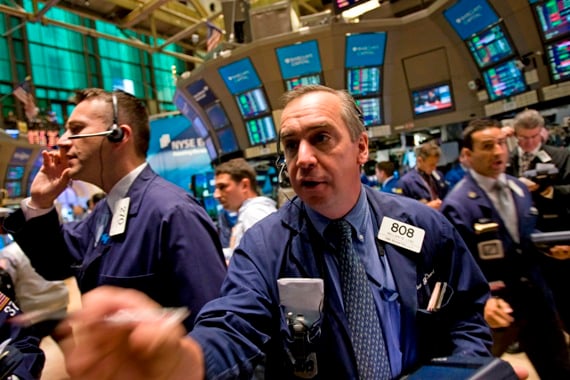The ongoing stock market sell-off, sparked by the deficit debate and the subsequent U.S. credit downgrade, is pulling down the prices of even the bluest of blue-chip stocks. No wonder so many investment managers are exhorting their clients to buy, buy, buy.
Wealthy investors should use the ongoing market rout to buy some of the biggest, most well-known U.S. companies, which are undervalued after getting dragged down with the broader market, said Darrell Cronk, an investment officer for Wells Fargo & Co.
Cronk, whose clients' average net worth ranges from $5 million to $10 million, said he started increasing allocations to large-cap equities about a week ago. The biggest U.S. companies, as measured by the Standard & Poor's 100 Index, are down about 4.6 percent this year, compared with a decline of 8.8 percent for small U.S. stocks in the Russell 2000 Index.
“People have that fear of losing money again, but there are fundamental reasons why we think this could be a good time to look at opportunities for clients' portfolios,” said Cronk, regional chief investment officer in the New York office of Wells Fargo Private Bank, which manages $180 billion in assets. “Corporate fundamentals are strong and economic fundamentals are very weak, so that means opportunity.”
Stocks in the S&P 100 had an average price-to-earnings ratio of 12.3 compared with 33.2 for the Russell 2000 before the start of trading on Monday. Microsoft Corp., the world's biggest software maker, had a ratio of 9.77, while for Johnson & Johnson, the world's second-largest maker of health care products, it's 12.93. Price-to-earnings ratios compare the equity's price with the company's earnings per share. A low ratio may indicate a stock is undervalued.
‘Buy Into Weakness'
The benchmark S&P 500 Index dropped 4.8 percent on Thursday to an eight-month low of 1,200.07 during a global rout. As of midday on Monday, the index was down an additional 2.88%. But chief strategists at 13 banks from Barclays Plc to UBS AG see the benchmark measure of American equity surging 17 percent through Dec. 31, the average estimate in a Bloomberg survey.
“Our mantra is to sell into strength and buy into weakness,” said Tom Orecchio, a fee-only adviser at Modera Wealth Management LLC, which has more than $1 billion in assets under management. “It means buying into the thing they're worried about.”
Orecchio, who is based in Westwood, New Jersey, has clients with an average net worth of about $4 million. He said he received one call yesterday morning and by the afternoon had heard from about 12 clients. One of his recommendations may be to put more money into large-cap stocks since allocations to them have fallen as the result of the stock market decline.
Dividend-Paying Stocks
Domestic stock funds lost $8.76 billion to redemptions in the week ended July 27, according to estimates from the Washington-based Investment Company Institute.
“Markets at the moment are dangerous and there's a prudent reason for caution, but making heroic decisions either to go to cash or all in, may not be the most appropriate solution,” said Mark Luschini, chief investment strategist for Philadelphia- based Janney Montgomery Scott LLC, which manages about $54 billion.
Investors should be selective buyers and focus on high-quality companies that pay dividends, such as Johnson & Johnson and Microsoft, Luschini said. Johnson & Johnson returned 1.8 percent with dividends reinvested this year through yesterday's close, while Microsoft has decreased about 6 percent.
The decline in the equity markets is “unnerving” for investors who are still licking their wounds from 2008, so their instincts are to go to cash or raise cash in their portfolios, said Luschini. Today's jobs numbers, which showed that the unemployment rate dropped to 9.1 percent and average hourly earnings climbed 0.4 percent, may make it easier to convince clients that they should buy certain stocks, he said.
Diversification
Paul Jacobs, a certified financial planner based in the Atlanta office of Palisades Hudson Financial Group, which manages more than $1 billion and whose clients have an average of about $20 million in assets, said he's looking at stocks of natural resource and real estate companies because they act as hedges against inflation.
“During days like today, diversification can be helpful, not just to be a cushion from the blow of the stock market, but to have dry powder, money you can liquidate and use to buy low,” Jacobs said yesterday.
Clients have been calling and asking whether they should be selling and putting all of their money in the bond market, according to Todd Morgan, senior managing director at Los Angeles-based Bel Air Investment Advisors, which oversees about $6 billion.
“My answer to that is no,” they should be looking to add more world-class multinational equities, like Starbucks Corp. and Apple Inc., Morgan said.
Value-Driven Investors
If the S&P 500 reaches 1,125 or 1,150, Morgan will take cash and buy more of those stocks, as well as those that pay dividends such as Procter & Gamble Co. (PG), the world's largest consumer-products company, he said.
“These kind of crises create squeeze points,” said Jonathan Krasney, who manages about $300 million at Krasney Financial LLC in Mendham, New Jersey. “People that are emotional lose their heads and get flushed down the market. People that are more value driven look for more ways to profit.”
--Bloomberg News--







